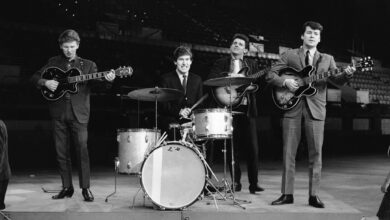Jim Reeves’ ‘He’ll Have to Go’ Dominates Country and Pop Charts in 1960
In 1960, Jim Reeves’ timeless classic “He’ll Have to Go” became a cultural phenomenon, bridging the gap between country and pop music. The song, with its smooth baritone vocals and lush orchestration, captured the hearts of listeners across genres, cementing Reeves’ status as a pioneer of the Nashville Sound. Its success was not just a milestone for Reeves but also a defining moment in the evolution of country music, showcasing its potential to appeal to a broader audience.
Jim Reeves, often referred to as “Gentleman Jim,” was already a well-established figure in the country music scene by the time “He’ll Have to Go” was released. Born in Texas in 1923, Reeves began his career as a radio announcer and part-time singer before transitioning to full-time music. His rich, velvety voice and polished demeanor set him apart from the rougher, more traditional country artists of the time, earning him a reputation as a sophisticated crooner.
The story behind “He’ll Have to Go” is as intriguing as the song itself. Written by Joe and Audrey Allison, the track was inspired by a real-life conversation overheard by Joe in a bar. A man on the phone was trying to win back his lover, telling her to “put your sweet lips a little closer to the phone.” This poignant line became the song’s opening hook, setting the stage for a narrative of love, longing, and heartbreak.
Reeves’ recording of the song was a masterclass in subtlety and emotion. Produced by Chet Atkins, the track featured a minimalist arrangement that allowed Reeves’ voice to take center stage. The gentle strumming of the guitar, the soft hum of the backing vocals, and the understated orchestration created an intimate atmosphere, drawing listeners into the story of a man pleading for a second chance with his estranged lover.
Upon its release, “He’ll Have to Go” quickly climbed the charts, achieving unprecedented success. It spent 14 weeks at the top of the Billboard Country Chart and crossed over to the Pop Chart, where it peaked at number two. This dual-chart dominance was rare for a country song at the time, highlighting Reeves’ ability to transcend genre boundaries and appeal to a diverse audience. The song’s success also marked a turning point for country music, proving it could compete with mainstream pop.
The impact of “He’ll Have to Go” extended beyond its chart performance. It became a cultural touchstone, resonating with listeners who found solace in its relatable themes of love and loss. The song’s universal appeal was further amplified by Reeves’ delivery, which blended vulnerability with a quiet confidence. His ability to convey deep emotion without over-singing made the track feel personal, as if he were speaking directly to each listener.
Reeves’ career trajectory was forever changed by the success of “He’ll Have to Go.” The song solidified his reputation as one of country music’s most influential artists and opened doors for him internationally. Reeves became a global ambassador for the genre, touring extensively and gaining fans in Europe, Asia, and beyond. His polished image and sophisticated sound helped redefine country music, paving the way for future artists to explore crossover appeal.
The song’s influence on the music industry cannot be overstated. It played a crucial role in popularizing the Nashville Sound, a subgenre characterized by its smooth production, orchestral arrangements, and crossover potential. This style, championed by Reeves and producers like Chet Atkins, marked a departure from the raw, honky-tonk sound of traditional country music, making the genre more accessible to mainstream audiences.
“He’ll Have to Go” also inspired countless artists across genres. Its timeless melody and heartfelt lyrics have been covered by a wide range of musicians, from Elvis Presley to Ry Cooder. Each rendition pays homage to the original while adding a unique twist, demonstrating the song’s enduring versatility. Reeves’ version, however, remains the definitive one, a testament to his artistry and the song’s universal appeal.
Tragically, Jim Reeves’ life was cut short in 1964 when he died in a plane crash at the age of 40. His untimely death left a void in the music world, but his legacy lived on through his recordings. “He’ll Have to Go” continued to be a staple on radio stations and jukeboxes, ensuring that Reeves’ voice would never be forgotten. Posthumously, he was inducted into the Country Music Hall of Fame, a fitting tribute to his contributions to the genre.
The song’s lasting influence is evident in its continued popularity decades after its release. It has been featured in numerous films, television shows, and commercials, introducing it to new generations of listeners. Its timeless quality lies in its simplicity and emotional depth, qualities that resonate as strongly today as they did in 1960. For many, “He’ll Have to Go” remains the quintessential love song, a masterpiece of storytelling and melody.
Reeves’ ability to blend country and pop sensibilities set a precedent for future artists. His success with “He’ll Have to Go” demonstrated that country music could be both authentic and commercially viable, inspiring a new wave of artists to experiment with crossover sounds. This legacy is evident in the work of modern country stars like Shania Twain, Taylor Swift, and Keith Urban, who have all achieved success by blending genres.
The song’s impact on Reeves’ career was profound, but it also had a broader cultural significance. At a time when the music industry was becoming increasingly segmented, “He’ll Have to Go” served as a unifying force, bringing together fans of different genres. Its success challenged stereotypes about country music, proving that it could be sophisticated, emotional, and universally appealing.
Even today, “He’ll Have to Go” continues to be celebrated as one of the greatest country songs of all time. Its inclusion in various “best of” lists and its enduring presence in popular culture attest to its timeless appeal. The song’s ability to evoke emotion and tell a compelling story ensures that it will remain a beloved classic for generations to come.
Jim Reeves’ “He’ll Have to Go” is more than just a song; it’s a piece of musical history. Its success in 1960 marked a pivotal moment in the evolution of country music, showcasing its potential to transcend boundaries and touch the hearts of listeners worldwide. Reeves’ legacy as a trailblazer and the song’s enduring popularity serve as a reminder of the power of music to connect, inspire, and endure.



